If dairying began in the Paleolithic era, as I believe it did, then our genes have been depending on these nutrients for thousands of generations. Learn how your skeletal development can be sculpted by dairy products.
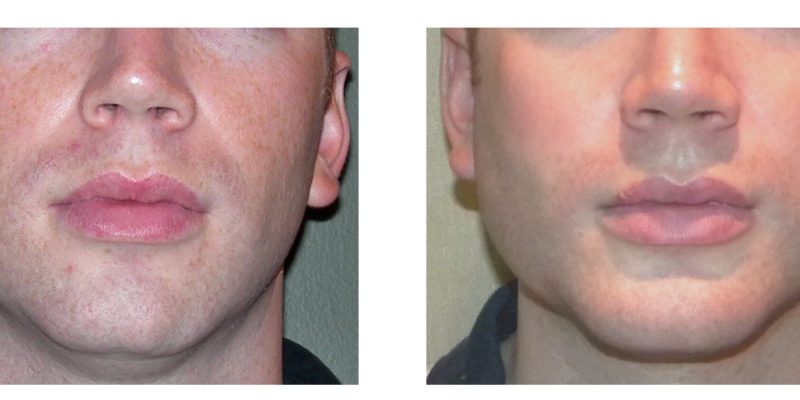
Why Vegans and Primal-Paleo Dietary Types Should All Just Get Along
I hate my chin.
Seriously. I have a weak chin. And I really don’t like it.
That’s why I’m not a big fan of rooms with mirrors on three walls. I’m thinking of the dressing room at Macy’s, and the place where I get my hair cut, and the bathroom at the YMCA where Cate and I go every week to swim laps.
Standing there in the Y bathroom in my goofy swim trunks, seeing myself from this So this is how others see me perspective, I’m usually able to convince myself that my shoulders are sort of wide, and that maybe all the running and swimming and better eating are paying off.
This article is continued below...(scroll down)
But then I find myself looking at my chin, and I realize how I’ll never swim my weak chin away. There it is. It will always be there. And there’s just no avoiding all those mirrored rooms waiting to remind me.
I bring this up so that you’ll understand that I really do get it when people get all fired up over the opening chapters in our book Deep Nutrition, which deal in part with the way our looks (Cate would say “our anatomies”) are affected by dietary choices. Politics, race, religion, physical appearance—such third-rail topics cut close to the bone, and we take these things so personally because they can so powerfully govern our life experience, everything from what we choose to do for a living to the people we count as friends. In various degrees, they help define who we are.
But what I’m a really confused about is why, just recently, we’re all starting to take our dietary choices so personally. If you read the nutrition blogs, you’ve seen how vicious people can get: “The author claims to be Paleo, but he’s obviously Primal! What a FAKE!” “Good for him, being a ‘conscientious’ vegetarian. I see he still recommends eggs! MURDERER!” “She acts like she came up with the whole idea of linking anatomy with health herself! Weston Price came up with that WAY before she did!!! And she doesn’t give him ANY credit in her book!!!”
I recently watched a Youtube video of a well-known vegan commentator (an Australian fellow who, I swear, sounds just like the Geico Gecko) doing a slide-by-slide hit-list presentation of his nutritional enemies and indicting each one for not looking “buff” enough.
The reason I’ve brought all this up is that, just this week, I almost fell into the same trap. I almost took this nutrition stuff personally.
Here’s what happened: I was reading Dr. T. Colin Campbell’s best-selling book, The China Study. The thing is, I’ve got this vegan buddy and he’s a super guy and very, very smart. While we were chatting he brought up something from The China Study—a book I’ve read—and I couldn’t remember the data he was referencing, so I felt I should probably read it again.
Which I did.
But then, on page 59, I got angry. I ran into a section entitled “NOT ALL PROTEINS ARE ALIKE,” one of many sections in The China Study suggesting that animal proteins are extremely unhealthy. Here’s a quote: “Controlling cancer through nutrition was, and still is, a radical idea. But as if this weren’t enough, one more issue would yield explosive information: did it make any difference what type of protein was used in these experiments? For all these experiments, we were using casein, which makes up 87% of cow’s milk protein. So the next logical question was whether plant protein, tested in the same way, has the same effect on cancer promotion as casein.”
Which made me wonder, “Did it make any difference what type of protein was used in these experiments?”
For example, why is casein used to represent all animal protein? “Casein…makes up 87% of cow’s milk protein”? Really? Milk from where? What breed of cow? What was the cow fed? At what time of the season was this milk collected? Was the milk pasteurized or otherwise processed? How was the casein isolated from the milk? What was the full nutritional context in which this isolated casein was introduced (to the rats)?
While we’re on the subject, can you tell me more detail about the “plant protein” used for comparison? You mention gluten and soy proteins: How were these isolated? From what sources, specifically? In what nutritional context were they introduced?
Here’s the “next logical question”: Do such details matter?
I think they do, a lot. That’s why science is so hard, and the reason scientists sometimes ignore, at their conclusions’ peril, Einstein’s advice to make things “as simple as possible, but no simpler [italics mine].” As one respected nutrition researcher succinctly put it, “Not all proteins are alike”! That’s a good point, made by the same man who said (on page 20 of The China Study), “We oversimplify and disregard the infinite complexity of nature. Often, investigating minute biological chemical parts of food and trying to reach broad conclusions about diet and health leads to contradictory results.”
Which is why it might prove problematic to make broad conclusions about diet and health based on an experimental contest between, say, “casein” and “plant protein.” Right?
Oh darn. Here I am getting angry again.
It’s not Dr. Campbell’s fault. It’s Cate’s. See, she’s one of those scientist types, and she can’t resist getting all huffy-puffy when she runs into what appears to be sloppy science (or sloppy scientific writing), and now she’s got me doing it. She often reminds me that, as far as she’s concerned, sloppy science is more than an aesthetic problem, like some bothersome carpet stain in one of the great halls of medicine.
Bad science can lead to bad consequences. People can get hurt.
People like Cate’s brother, who had leukemia. Or me, with my weak chin and the long list of health problems I suffered from until I got turned on to a more holistic diet—all largely due to sloppy science. My parents were both raised in an era when expectant mothers were told, by confident men in white lab coats, that they could pretty much eat and drink and smoke whatever they wanted and it wouldn’t do all that much to impair the health of their growing baby.
Bad science. Bad advice. And, for me, lots of lots of rooms with floor-to-ceiling mirrors.
And so, in the same way I understand why some readers get upset about the DN chapters on nutrition and looks, please understand why I was tempted to take what I took to be unsubstantiated scientific conclusions personally.
Which brings me to my point, about forgiveness, dialogue and—heck, as long as I’ve gone this far, I might as well go all the way—love.
Bad science happens when people take scientific conclusions personally—theirs or anyone else’s. It happens when they think they are defined by their scientific beliefs and, for that reason, refuse to expose those beliefs to the criticisms and suggestions of others.
Bad science happens when we fall so deeply in love with our beliefs that we coddle and defend them rather than release them to the wilderness of frank and open discourse.
Bad science happens when we stop listening, even, to the friendliest voices of our detractors, many of whom are just like us: Decent folks just trying to figure things out.
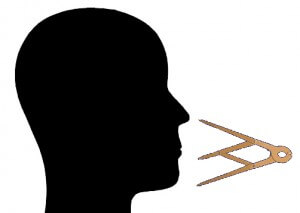
Dr. Campbell didn’t cause my health problems. In fact, I’ll bet if he could go back in time carrying a satchel filled with the best nutritional information, he would do his best to help me out. True, some of the science in his book drives me a little batty. But I choose to believe that, just like Cate, his earnest intention is to help people live better, healthier lives. And according to the vast majority of the folks who have reviewed his book on Amazon, his efforts have not been in vain. After reading his book, lots of folks have been effectively convinced to stop eating processed foods and to start eating plenty of (organic) veggies more, and to start cooking for themselves. And their health is now the better for it.
So while I might complain about the logical, and procedural, errors in sloppy science, you won’t catch me complaining about a good man with good intentions creating good results.
And if Dr. Campbell and I are simpatico on this whole lovey-dovey, let’s all keep the dialogue going for the betterment of science stuff, I’ll bet he will be more than happy to explain to me exactly how I have misjudged those excerpts of his book.
And I will listen.
I’ll listen, because I honestly believe I have far more in common with a kind and reasonable vegan nutrition researcher than I do with any of the mean-spirited name callers on the nutrition blogs.
That’s why I plan to thank Dr. Campbell for getting folks to pass by the processed foods on their way to the vegetable section, and to congratulate him on all his recent success. Then, if I remember, I’ll tell him how handsome he looks on the photo on his book’s dust jacket. He really does. He’s got a nice, strong chin—just one the many benefits of being raised on the traditional foods of a family farm.
Lucky guy.
This Post Has 14 Comments
Comments are closed.
Note: Please do not share personal information with a medical question in our comment section. Comments containing this content will be deleted due to HIPAA regulations.


















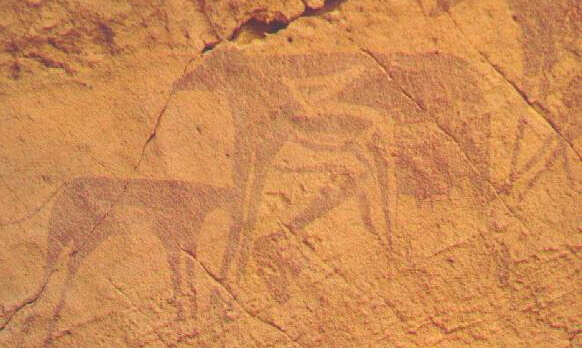
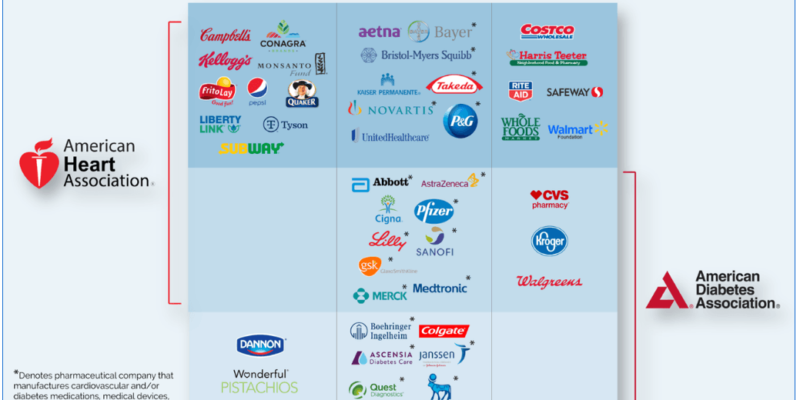
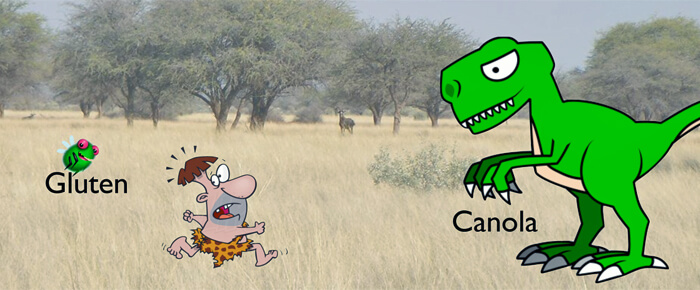
What about the concept of periodic hard-core fasts from protein, to replicate weeks/months when the hunt was bad or non-existant, and also to tie in with the noted good points of intermittant (or just plain religious) fasting?
I see people go vegan and start looking fabulous for a while, and IMO it’s the reduced gluten (usually replacing wheat with rice) and the reduced veg fat you get with ANY “healthy” diet, I’m primal-leaning towards paleo – and noticed a few weeks living off JUST veg soup and a biot of dairy did wonders for my skin etc but then I started to feel rubbish. Also, historically peoplem would abstain from
meat and eggs during Lent, so I wonder… going to deploy this myself maybe one month a year but curious about your opinion too? 🙂
These days the extended noncaloric fasts (more than 3 days) may not be well tolerated because we are physiologically less sound than our ancestors were.
In addition to what you say about looking fabulous early on, keep in mind that gluten is a protein that occurs naturally in wheat and its more likely the removal of processed foods that comes automatically with gluten restriction that is responsible for health gains.
David, I came across this article when I did a search for reviews comparing Deep Nutrition to The China Study. Long story short, I read TCS about 2 years ago after experiencing some great quality of life improvements from going vegan. I shared the book with one of my closest friends, and she also went vegan. Then about 2 months ago she mailed me a copy of DN asking that I read it for the two of us to discuss. I have not finished DN yet, but I would really like to know why the two concepts between TCS and DN are so different yet both make arguments that each is the key to living longer, healthier, better quality lives. Are you aware of any other commentaries or reviews that I could read that would compare the two different approaches? Thanks.
Fascinating post, but I don’t understand why you think you have a weak chin. You’re a very attractive woman.
Why thank you, David. But Luke wrote this post!
Thanks for saying, David. But I wrote this one. If you meant to say that I, Luke, am a very attractive women, well then what the heck: I’ll take it. —L
Thanks Alexandra. That’s so sweet of you. I like you you put it, how what matters is our ability to still create value. In the book “The God Academy,” the author talks about this concept, how what we really are after is significance, a chance to serve. That’s what it’s all about.
Luke Thank you so much for writing this!!!! I have so much appreciation for Dr Cate’s book, and yet, I’ll never look at my face or body in the same way. Rather than feeling inferior, I appreciate your focus on love and forgiveness. It makes me feel that we can still aim for higher standards in our current states – and that our lives still have the capacity to create value, even if I’m not as smart or pretty as I could have been : )
I have huge appreciation and admiration for you both!!! In my eyes you’re two of the most beautiful souls in the world!!!
Good point, Josh.
That’s a good point, Stabby.
Luke S.
Kay:
Sugar is sugar! Why substitute?
Same goes for the sugar your body gets from wheat flour.
The answer is not substitution, it’s limitation. Keep all carbs under 100gm total intake per day, and less than 75 if you need to lose fat.
I agree that we should simply discuss facts and ideas and we shouldn’t any enmity towards each other, what’s the point of that? I find myself making that mistake less and less, which is a good thing, but sometimes I can’t help but come dangerously close to that line. Your observations are completely right regarding “animal” proteins, and it doesn’t stop there, have you seen Chris Masterjohn’s article on the subject? http://www.westonaprice.org/blogs/cmasterjohn/2010/09/22/the-curious-case-of-campbells-rats-does-protein-deficiency-prevent-cancer/
And Chris’s latest article http://www.westonaprice.org/blogs/cmasterjohn/2011/09/27/taking-a-trip-down-memory-lane-fishing-for-our-good-friend-glutathione-in-the-waters-of-the-memory-hole-how-t-colin-campbell-helped-prove-that-protein-protects-us/
So yes, we should be nice to each other, and recognize it when somebody clearly cares about improving the lives of others, which he does, but we don’t always have to keep having a dialogue! Sometimes we have to recognize some people as simply being incompatible with ourselves in some respects and leaving it at that. It’s like how I don’t talk about religion with my grandparents. It is best to see the many facets of a person instead of seeing them in one dimension like is the natural but pernicious tendency to do.
this is North West Iowa there is no-one up here. Especially there are no health food stores. What do we substitute for wheat flour?? is there a sugar substitute that we sugar addicts can use. Need specifics!!we do have free range chickens Yum! the other meat is questionable.
Yeah it’s really amazed me how dogmatic people are about nutrition. I guess I can get that way too, where I hear someone talking about veganism or low-fat low-cholesterol and I instantly stop listening to them, but when it gets to the point where people start bashing each other in “best diet wars”, rather than helping the millions of people who still eat processed garbage all day, it gets a bit counterproductive.